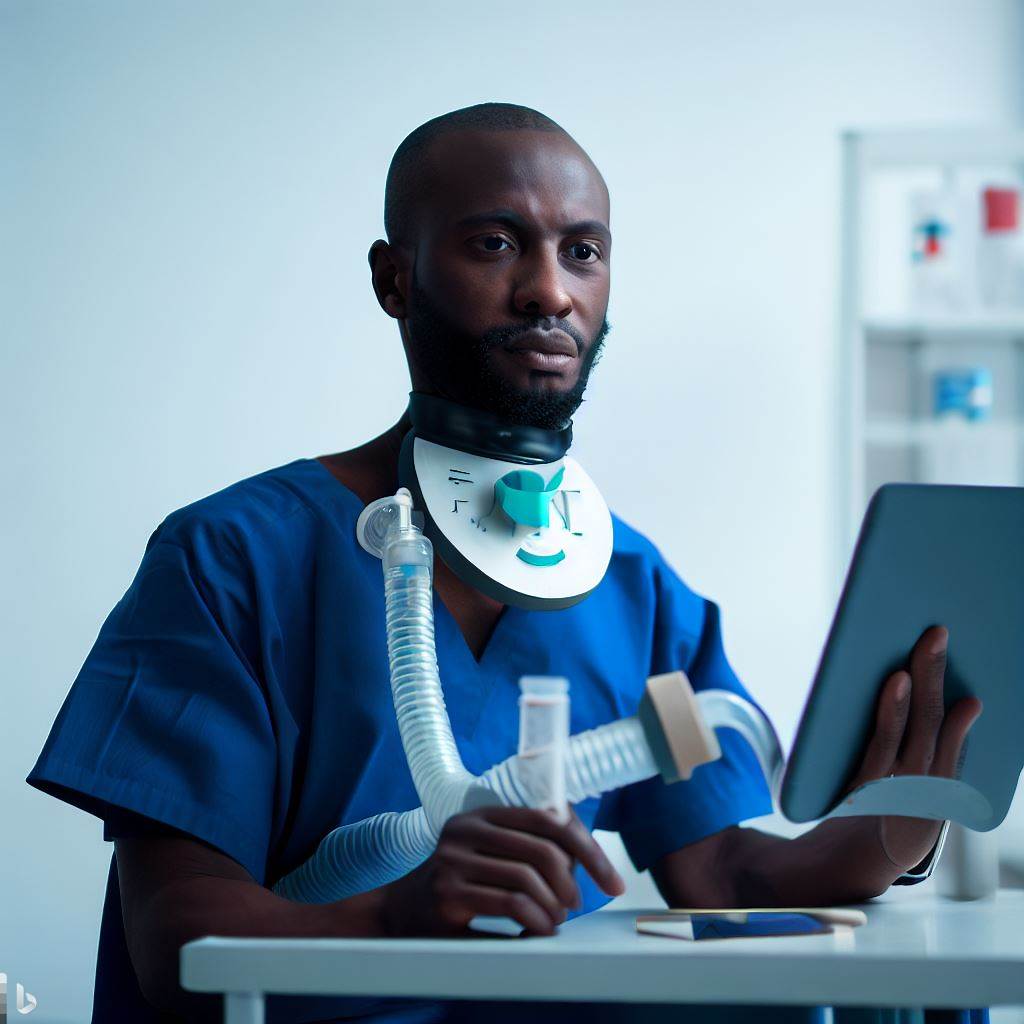Introduction
This blog post delves into the pivotal role of technology in transforming respiratory therapy in Nigeria.
Advancements in technology have led to a revolution in this field, providing numerous benefits, while also presenting some challenges and exciting future prospects.
Technological innovations have significantly improved respiratory therapy in Nigeria.
The introduction of state-of-the-art equipment and devices has enhanced the accuracy and efficiency of diagnosis and treatment.
With the aid of technology, healthcare professionals can now offer more precise and personalized care to patients suffering from respiratory conditions.
However, this rapid integration of technology has not been without challenges.
Access to advanced equipment and training for healthcare providers in remote areas remains a concern.
Moreover, the cost of implementing and maintaining sophisticated technology can be prohibitive for some healthcare facilities.
Looking ahead, the future prospects are promising.
As technology continues to evolve, there is the potential for even more groundbreaking solutions.
This includes advancements in telemedicine, wearable devices for continuous monitoring, and AI-driven diagnostic tools, which could further enhance respiratory therapy outcomes across Nigeria.
In summary, the role of technology in respiratory therapy in Nigeria cannot be overstated.
Embracing and overcoming the challenges will lead to a more comprehensive and effective respiratory care system, ensuring better health outcomes for patients across the country.
Current State of Respiratory Therapy in Nigeria
The Healthcare System in Nigeria and the Challenges Faced by Respiratory Therapists
Nigeria’s healthcare system is characterized by inadequate infrastructure and a shortage of healthcare professionals.
Respiratory therapists in Nigeria face challenges such as limited resources, lack of specialized training, and low awareness of their role.
There is a scarcity of respiratory therapists in Nigeria, with a limited number of professionals serving a large population.
The healthcare system also lacks proper equipment and technology for respiratory therapy practices in most healthcare facilities.
Respiratory therapists in Nigeria often struggle to provide quality care due to the lack of necessary resources and support.
Moreover, the ongoing brain drain of healthcare professionals further exacerbates the shortage of respiratory therapists in the country.
The Importance of Respiratory Therapy in Managing Respiratory Diseases
Respiratory therapy plays a vital role in the management and treatment of respiratory diseases in Nigeria.
Respiratory therapists are responsible for helping patients with conditions such as asthma, chronic obstructive pulmonary disease (COPD), and respiratory infections.
They provide essential services like administering oxygen therapy, conducting breathing exercises, and managing mechanical ventilators.
By focusing on early intervention and preventive measures, respiratory therapy helps reduce the burden of respiratory diseases in Nigeria.
Specialized respiratory therapy interventions contribute to improved patient outcomes and overall quality of life for individuals with respiratory conditions.
The Limitations and Gaps in the Current Respiratory Therapy Practices in Nigeria
One of the major limitations in respiratory therapy practices in Nigeria is the lack of standardized protocols and guidelines.
There is a need for standardized training programs and certifications for respiratory therapists to ensure uniformity in their practice.
Limited public awareness about the role and importance of respiratory therapists contributes to the challenges faced in this field of healthcare.
The scarcity of advanced technology and sufficient resources hampers the delivery of optimal respiratory therapy in Nigeria.
Healthcare facilities must invest in modern equipment and technology to improve the efficiency and effectiveness of respiratory therapy services.
Basically, the current state of respiratory therapy in Nigeria is fraught with challenges stemming from a deficient healthcare system, limited resources, and a scarcity of trained professionals.
Respiratory therapy plays a crucial role in managing respiratory diseases, but its potential is hindered by the lack of standardized protocols, insufficient awareness, and inadequate technology.
To address these limitations and gaps, Nigeria needs to focus on improving healthcare infrastructure, expanding training programs, and investing in modern equipment.
Only then can respiratory therapists effectively contribute to the management of respiratory diseases and improve the overall health outcomes of Nigerians.
Introduction of Technology in Respiratory Therapy
Technology has played a significant role in transforming the field of healthcare worldwide, including respiratory therapy.
In this section, we will explore the introduction of technology in respiratory therapy and its potential benefits in Nigeria, a developing country with a growing burden of respiratory diseases.
Technological Advancements in Healthcare
Before diving into the specifics of respiratory therapy, it is vital to acknowledge the broader influence of technological advancements in healthcare globally.
Technology has brought about significant improvements in patient care, diagnosis, treatment, and overall outcomes.
With cutting-edge innovations, healthcare professionals can provide accurate and efficient care to patients, saving lives and enhancing quality of life.
Examples of Technology in Respiratory Therapy
Respiratory therapy, a specialized field within healthcare, has witnessed several technological advancements that have revolutionized the way treatments are delivered.
One prominent example is the use of mechanical ventilators, which provide respiratory support to patients with compromised lung function.
These ventilators can be programmed to deliver specific modes of ventilation tailored to each patient’s needs.
Another notable technology used in respiratory therapy is the pulse oximeter.
This device measures the oxygen saturation level in the blood, allowing therapists to monitor a patient’s respiratory status continuously.
Furthermore, portable oxygen concentrators have played a crucial role in enhancing the mobility and independence of individuals with chronic respiratory conditions, such as chronic obstructive pulmonary disease (COPD).
Potential Benefits of Incorporating Technology in Respiratory Therapy in Nigeria
As Nigeria grapples with an increasing burden of respiratory diseases, incorporating technology in respiratory therapy can have various benefits.
Firstly, advanced technologies can empower healthcare practitioners to deliver more accurate diagnoses and personalized treatment plans, resulting in improved patient outcomes.
This is especially crucial in a resource-constrained setting like Nigeria, where access to specialized respiratory care can be limited.
Additionally, technology can help bridge the gap between rural and urban healthcare facilities.
Telehealth and telemedicine platforms allow remote consultations and monitoring, enabling patients in remote areas to receive timely respiratory care without the need for long-distance travel.
This not only saves time and money but also reduces the strain on overcrowded urban healthcare centers.
Furthermore, the integration of technology in respiratory therapy can enhance data collection and analysis, leading to a better understanding and management of respiratory diseases at the population level.
By harnessing the power of electronic health records and data analytics, healthcare providers and policymakers can make informed decisions to address respiratory health challenges efficiently.
Therefore, the introduction of technology in respiratory therapy has proven to be transformative globally.
From mechanical ventilators to portable oxygen concentrators, these technological advancements are now being embraced in Nigeria.
The potential benefits of incorporating technology in respiratory therapy in Nigeria are immense, from improving patient outcomes to bridging healthcare gaps and optimizing disease management.
By leveraging technology, the field of respiratory therapy can greatly contribute to improving respiratory health in Nigeria and beyond.
Read: Public Perception of the Optometry Profession in Nigeria

Advancements in Respiratory Technology
Advancements in respiratory technology have significantly improved patient care, diagnosis, and treatment.
Portable oxygen concentrators allow patients to receive oxygen therapy on the go, promoting mobility and independence.
Smart inhalers track medication usage, enhancing adherence and reducing exacerbation risks.
Other countries utilize robotic-assisted ventilation systems and telemedicine consultations, resulting in better care and outcomes.
Implementing similar technologies in Nigeria holds great potential.
In rural areas with limited healthcare access, portable oxygen concentrators can benefit patients by enabling home-based respiratory therapy, reducing hospital visits.
Smart inhalers offer real-time data to manage conditions, preventing unnecessary admissions.
Investing in these technologies is vital to alleviate the burden of respiratory diseases and improve overall healthcare.
Training healthcare professionals in technology use is crucial for safe and effective patient care.
Technological advancements revolutionize respiratory therapy, enhancing access, quality, and treatment outcomes.
By adopting and implementing these innovations, Nigeria can significantly improve respiratory care and enhance the lives of patients.
Read: Optometry Practices: Rural vs Urban Areas in Nigeria
Delve into the Subject: Career Spotlight: A Day in the Life of a Nigerian Dietitian
Challenges and Limitations in Implementing Technology in Nigeria
Barriers to Technology Adoption in the Nigerian Healthcare System
- Inadequate infrastructure and limited access to reliable electricity hinder technology implementation.
- Inadequate funding for healthcare technology and lack of financial investment in the healthcare sector.
- A shortage of trained healthcare professionals who can effectively utilize and maintain respiratory technology.
- Limited awareness and understanding of the benefits and potential of technology in respiratory therapy.
- Resistance to change from healthcare professionals who may be reluctant to embrace new technologies.
Potential Challenges of Implementing Respiratory Technology in Nigeria
- High cost of respiratory technology can make it unaffordable for many healthcare facilities and patients.
- Lack of local manufacturing capabilities leads to dependence on foreign suppliers and expensive imports.
- Poor maintenance culture leading to the breakdown of respiratory technology and limited access to repair services.
- Inadequate training and education programs to equip healthcare professionals with the necessary skills to use respiratory technology.
- Lack of standardized protocols and guidelines for the use of respiratory technology in Nigeria.
Strategies and Solutions to Overcome these Challenges
- Investment in infrastructure development, such as reliable electricity supply and internet connectivity.
- Increase funding allocation for technology in healthcare to improve affordability and accessibility.
- Enhance training programs to educate and empower healthcare professionals on respiratory technology usage.
- Promote awareness campaigns to educate the public and healthcare professionals on the benefits of respiratory technology.
- Encourage collaboration between healthcare institutions and technology developers to address specific needs and challenges.
- Advocate for the development of local manufacturing capabilities to reduce dependence on imports.
- Establish maintenance and repair facilities to ensure the continuous functionality of respiratory technology.
- Work towards the creation of standardized protocols and guidelines for the use of respiratory technology in Nigeria.
Read: Interviews with Successful Nigerian Optometrists
Discover More: Challenges and Opportunities in Nigeria’s Medical Profession
The Future of Respiratory Therapy in Nigeria with Technology
Discuss the potential impact of technology on the future of respiratory therapy in Nigeria
The emerging technological advancements hold immense potential to revolutionize respiratory therapy in Nigeria.
With the integration of technology, respiratory therapists can provide more efficient, accurate, and personalized care to patients.
Firstly, technology can greatly enhance diagnosis and monitoring processes.
Advanced imaging techniques, such as computed tomography (CT) scans and magnetic resonance imaging (MRI), allow for the detailed visualization of the respiratory system, aiding in the identification and management of respiratory conditions.
Additionally, wearable devices and remote monitoring systems enable continuous health assessment, facilitating the early detection of any deterioration or exacerbation in patients’ respiratory status.
This real-time data can be shared with healthcare providers, ensuring timely interventions and reducing the risk of complications.
Furthermore, technology offers a platform for telemedicine and teleconsultations.
This is particularly beneficial in a country like Nigeria, where access to specialized respiratory care might be limited in certain regions.
Telemedicine allows patients to consult with respiratory therapists and receive expert advice or treatment remotely, eliminating the need for travel and enabling better patient outcomes.
Highlight the opportunities for improvement and advancement in respiratory care
The integration of technology opens up several opportunities for improvement and advancement in respiratory care in Nigeria.
Firstly, electronic medical records (EMR) systems can streamline the documentation process, making patient information easily accessible and reducing the chances of errors.
This enables healthcare providers and therapists to have comprehensive and up-to-date information for accurate diagnosis and treatment planning.
Moreover, the use of digital educational resources and online platforms can enhance knowledge sharing among respiratory therapy professionals in Nigeria.
Access to online courses, webinars, and virtual conferences allows for continuous professional development, ensuring therapists stay updated with the latest advancements in the field.
In addition, technology can facilitate remote training and mentorship programs, connecting experienced therapists with those in remote or underserved areas.
Publish Your Professional Profile, Business or Brand
Showcase your expertise, gain trust, and boost visibility instantly on Professions.ng.
Publish NowThis promotes skill development and improves the overall quality of respiratory therapy services across the country.
Emphasize the need for investment, collaboration, and support to fully integrate technology in respiratory therapy in Nigeria
To fully harness the potential of technology in respiratory therapy, it is crucial to prioritize investment, collaboration, and support.
Firstly, the government and healthcare institutions should allocate sufficient funds to procure and maintain advanced respiratory technology.
This includes providing adequate resources for the purchase of imaging equipment, remote monitoring systems, and telemedicine infrastructure.
Collaboration between different stakeholders is essential for successful integration.
Healthcare providers, technology developers, and respiratory therapy associations should collaborate to establish standards, protocols, and guidelines for the use of technology in respiratory therapy.
This ensures uniformity, safety, and effective implementation of technology across different healthcare settings.
Furthermore, the government, private sector, and international organizations should support training programs that focus on developing proficiency in using respiratory technology.
This will help bridge the existing skill gap and ensure competent healthcare professionals who can leverage technology to its full potential.
In fact, the future of respiratory therapy in Nigeria holds great promise with the integration of technology. It has the potential to improve diagnosis, monitoring, and treatment outcomes.
However, to fully realize these benefits, it is imperative to invest in technology, foster collaboration, and provide the necessary support to healthcare professionals.
Read: Career Outlook: Surgeon Profession Landscape in Nigeria
Conclusion
Summarize the key points discussed in the blog post
Technology has greatly impacted respiratory therapy in Nigeria by improving diagnostic accuracy, patient monitoring, and treatment effectiveness.
Telemedicine and portable devices have made healthcare more accessible, especially in rural areas.
Additionally, the use of electronic medical records has streamlined patient data management.
Conclude the importance of technology in respiratory therapy in Nigeria
Technology plays a crucial role in enhancing respiratory therapy in Nigeria.
It not only improves patient outcomes but also increases efficiency in healthcare delivery.
Embracing and investing in technological advancements is essential for the progress of respiratory care in the country.
Call for action and awareness to encourage the adoption of technology in respiratory therapy in the country
To ensure the widespread adoption of technology in respiratory therapy, it is necessary to raise awareness among healthcare professionals, policymakers, and the general public.
Adequate funding, training programs, and infrastructure development should be prioritized to promote the integration of technology into respiratory care.
Let’s work together to embrace technology and improve respiratory therapy in Nigeria.




